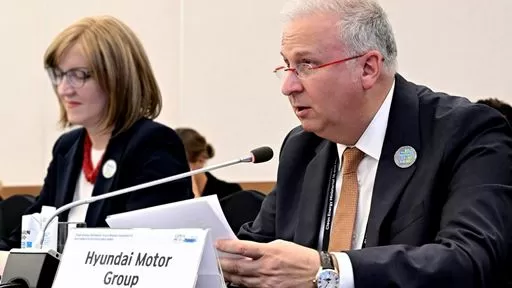Hyundai Motor Group, one of the world’s leading automotive companies, has recently highlighted the crucial role of hydrogen in decarbonization and energy resilience during two high-level dialogues at the 16th Clean Energy Ministerial (CEM16) and the 6th Mission Innovation (MI-6) held in Chile.
The CEM16 and MI-6, which took place virtually due to the ongoing COVID-19 pandemic, brought together government officials, industry leaders, and experts from over 25 countries to discuss the global transition to clean energy and the role of innovation in achieving this goal.
During these dialogues, Hyundai Motor Group emphasized the importance of hydrogen as a clean and sustainable energy source that can significantly contribute to decarbonization efforts and enhance energy resilience.
Hydrogen, often referred to as the “fuel of the future,” is a versatile energy carrier that can be produced from various sources, such as renewable energy, natural gas, and biomass. It can be used in fuel cells to generate electricity, power vehicles, and heat buildings, making it a highly versatile and efficient energy source.
At the CEM16, Hyundai Motor Group’s Executive Vice Chairman, Euisun Chung, delivered a keynote speech, highlighting the company’s commitment to promoting the use of hydrogen as a key solution for a sustainable future. He stated, “Hyundai Motor Group is committed to realizing a hydrogen society, and we are actively investing in research and development to make this a reality.”
The company has been a pioneer in the development and commercialization of hydrogen fuel cell technology, with its flagship fuel cell electric vehicle, the NEXO, already on the market. The NEXO boasts a range of over 600 kilometers and emits only water vapor, making it a zero-emission vehicle.
During the MI-6, Hyundai Motor Group’s President and Chief Innovation Officer, Youngcho Chi, participated in a panel discussion on the role of hydrogen in achieving clean energy goals. He emphasized the need for collaboration between governments, industries, and academia to accelerate the development and adoption of hydrogen technologies.
“Hyundai Motor Group is committed to working with governments, partners, and stakeholders to create a sustainable hydrogen ecosystem that will benefit not only the automotive industry but also the entire energy sector,” said Chi.
The company’s efforts in promoting hydrogen as a clean energy source are not limited to its own products. It has also been actively involved in various initiatives to build the necessary infrastructure for hydrogen production, storage, and distribution.
In partnership with the Korean government, Hyundai Motor Group is currently building the world’s largest hydrogen energy production plant, which will have a capacity of 100,000 tons per year. The company is also working on developing hydrogen-powered buses and trucks, further expanding the use of this clean energy source in the transportation sector.
Moreover, Hyundai Motor Group has also joined the Hydrogen Council, a global initiative that brings together leading companies to accelerate the development of hydrogen technologies and promote its widespread adoption.
The company’s efforts in promoting hydrogen as a key solution for decarbonization and energy resilience have been widely recognized. It was recently awarded the prestigious Hydrogen Award at the CEM16 for its outstanding contribution to the advancement of hydrogen technologies.
In conclusion, Hyundai Motor Group’s participation in the CEM16 and MI-6 highlighted its strong commitment to promoting the use of hydrogen as a clean and sustainable energy source. With its innovative fuel cell technology and efforts to build a hydrogen ecosystem, the company is playing a crucial role in the global transition to clean energy. As we continue to face the challenges of climate change and energy security, Hyundai Motor Group’s vision for a hydrogen society offers a promising solution for a greener and more sustainable future.



